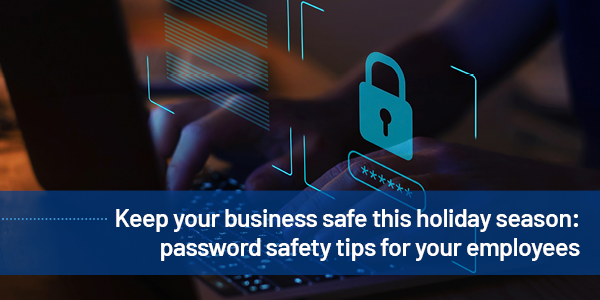Managing your technology shouldn’t be the last thing on your company’s holiday shopping list
The holiday season is in full swing, and many businesses, like yours, are busy preparing for the surge of shoppers and the rush of activity

The holiday season is upon us, and for many businesses, it’s the busiest time of the year. Amidst the chaos of long lines and increased foot traffic in your business, the last thing you want to worry about is a security breach.
The bad news is that a single compromised password can take the jolly “Ho! Ho! Ho!” right out of your profitable holiday season.
This time of year is known for an increase in cybercrime targeting small to mid-size businesses. In fact, one study showed that attempted ransomware attacks in November and December were 70% higher than in January and February of the same holiday season.1 The Grinch is just as busy as Santa this time of year.
Why?
Three reasons:
Because you are a diligent business owner, you already know that employee education is essential in protecting your company’s operational and customer data.
That education starts with the BIG BUILDING BLOCK of password security training. Here are some password safety tips to ensure your employees are doing their part to keep your business safe.
Avoid using pet names, birthdays, or common phrases as they are easily guessed by hackers. In addition, require your employees to change their passwords at least once every quarter.
Cybersecurity threats are a year-round issue, but the risk is higher during the holiday season. Encourage employees to follow these password safety tips to protect your business’s sensitive data. Remember to lead by example, making sure you follow these tips and update your business’s security policies regularly. By emphasizing security awareness, you can work to keep your business safe during the busiest time of the year and beyond.
Just one more thing…
One of the reasons that businesses like yours struggle with providing cyber-awareness training and supervision for current and temporary staff during the holiday season is understaffed IT departments. After all, your IT team deserves a break during the holiday season too, right? If your business is under-resourced in cybersecurity personnel, let’s talk about helping you get the protection your business needs throughout this holiday season.
The holiday season is in full swing, and many businesses, like yours, are busy preparing for the surge of shoppers and the rush of activity
The holiday season is upon us, and for many businesses, it’s the busiest time of the year. Amidst the chaos of long lines and increased
13 CALLE 5-45 LOCAL 2, Zona 10, Guatemala 01010